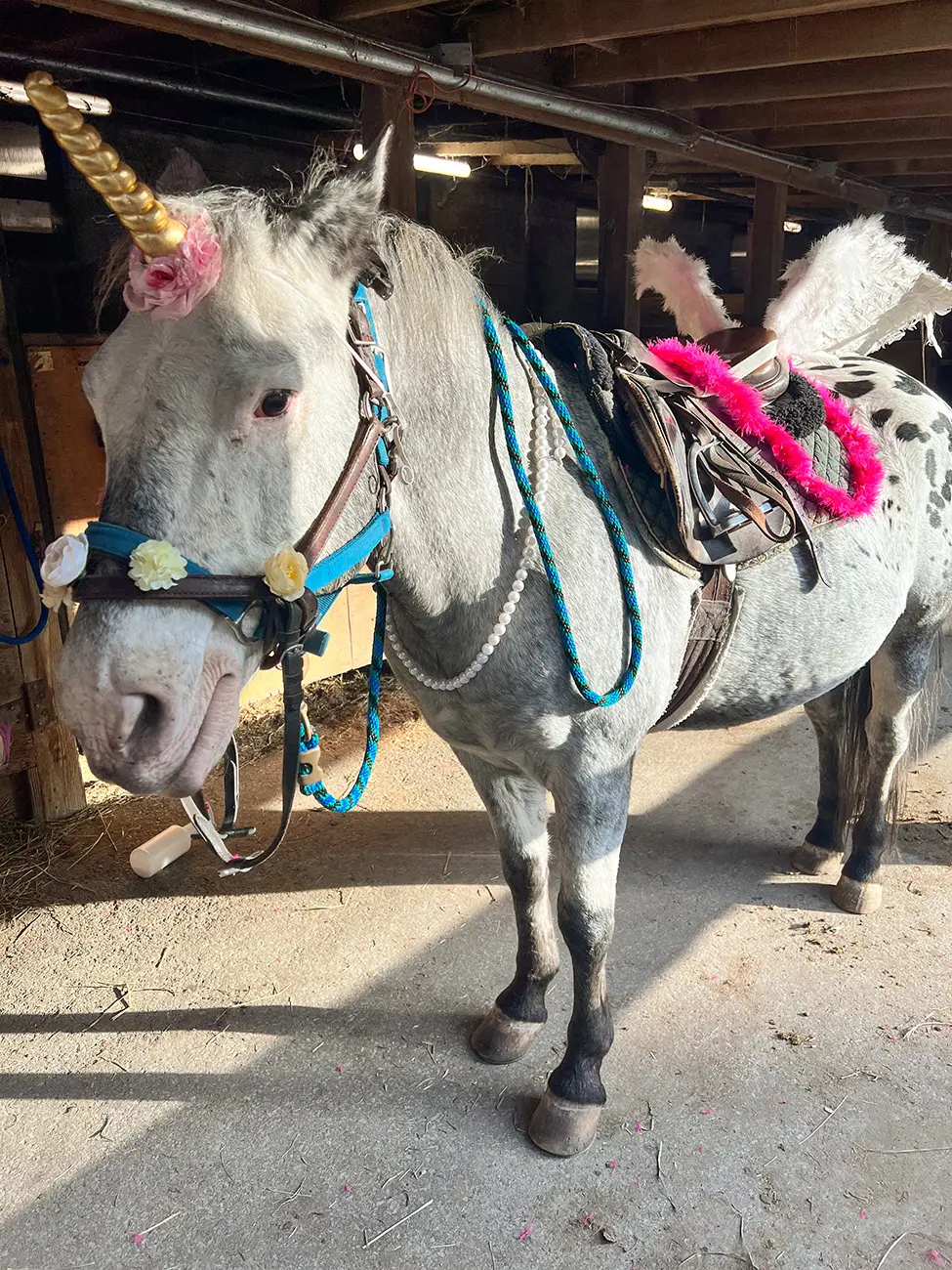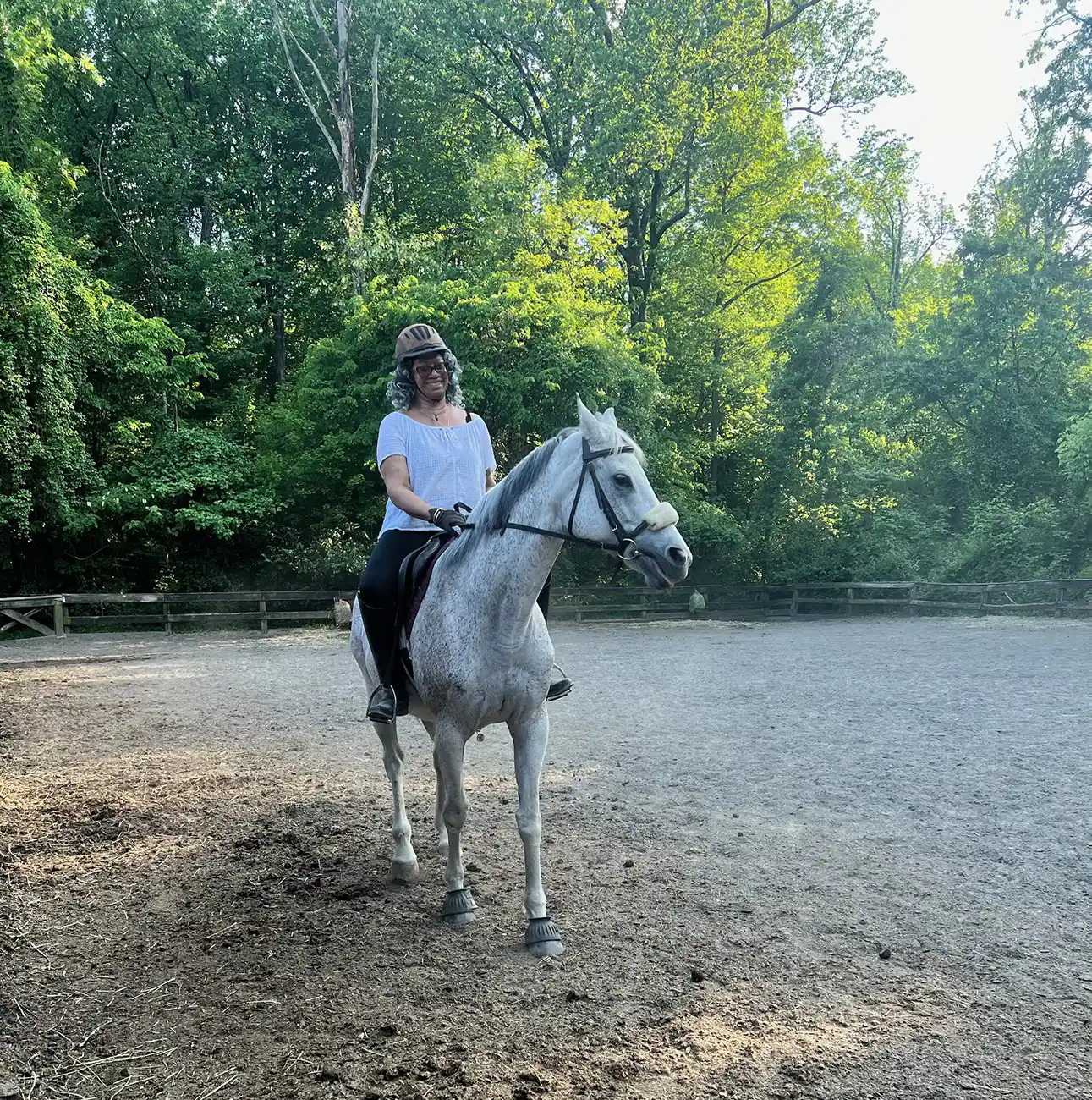There was no official notice posted to the tack room door. No email to staff and boarders. No letter to families. Just rumors passed from boarder to instructor, instructor to student.
Then the trailers arrived, confirming the suspicions that had been swirling: Rock Creek Park Horse Center was in trouble.
On Jan. 31, Laura Brown, then a Rock Creek instructor, first heard that the public barn, established by Congress in 1890, would be closing. The National Park Service owns the historic farm, nestled in Washington, D.C.’s Rock Creek Park for generations, while the company Guest Services Inc. held the concessions contract to run the program.
“We have a lot of older people who have ridden there for decades and decades,” Brown said of the barn. “We have just a really good community of adults who love the horses and love the place and have a longstanding history. And then we have kids who really want to be there and want to put their phones down and want to help and hang out and just be around horses. It’s really beautiful.”

Suddenly that community, fostered over decades, was in jeopardy. Guest Services, which did not respond to requests for comment on this story, was backing out of its concessionaire agreement with NPS, leaving the program—and its horses—in the lurch.
“The staff is all frantically trying to save these horses that we all just absolutely love,” Brown said. “And somehow it’s become my job to systematically break the hearts of all 30 people—most of them children—that I teach in a week, which is just an intensely unfair thing for management to put on our shoulders as instructors.”
That week, when trailers hauled away Sparks and Nutmeg, a pair of beloved leadline ponies, reality hit. The part-time instructor job had been a passion project for Brown, who daylights as a communications professional. But now her teaching shifts were filled with stress. Brown said there was no easy way to tell students that the program was being disassembled and the school horses sent off.
It was February, and the newly established U.S. Department of Government Efficiency threw many Washington residents into uncertainty just as the Rock Creek community was reeling from Guest Services’ decision.
“Every class is worse than the one before it,” Brown said in February. “Everyone’s dealing with really intense feelings about it. The ponies have already been sent away. It’s the worst week.
“And it’s really punctured by this backdrop of everything else that’s happening in D.C., where also all the adults are suddenly worried about their jobs, and the kids are stressed because their parents are stressed,” she continued. “Everything feels terrible for everybody.”
Brown said the staff received word that all of the Rock Creek lesson horses would need to find homes immediately. She remembers trying to find clarity amid the confusion.
“I was like, ‘Is there going to be a press release? Is there any way to keep the ponies an extra week so that all of the little kids can process their feelings?’ ‘No’ was the answer, because Guest Services was threatening that if the staff didn’t facilitate the horses leaving as soon as possible, [they would] just send them all to auction,” said Brown.
Because of the age of the lesson string—most of the horses are in their 20s—instructors knew that they would be especially vulnerable to kill buyers. They were able to get those first two leadline ponies, Sparks and Nutmeg, into retirement homes with former Rock Creek employees. But finding good homes for all the horses was going to be a huge task. The barn community couldn’t see their horses go to uncertain fates without being moved to action.
ADVERTISEMENT

Ingrid Beckles is a longtime Rock Creek rider and boarder who grew up in Washington, D.C. “It’s like a sanctuary,” she said of the barn where she’s ridden since the 1970s. Beckles said that the mood shift following the news about the barn closing was palpable.
“The giggling and the vibrancy that the pony girls bring to the barn is just wonderful, when you come to ride, and they’re in the [tack] room, because they’re going to exercise the horses, they’re just giggling and getting their boots on,” Beckles said of the program’s young students.
“You just have to know that to hear that their space where their heart lives might be gone, the tears rolled for weeks with various ways,” she continued. “And the anger and the little ones stamping their feet—they are quite demonstrative these days, young ladies are.”
Beckles and the other boarders wrote to NPS to ask the agency to keep the center open and find another subcontractor. She described how Rock Creek’s legacy intertwined with her own family over the decades.
“I think I sent in my entire life history with horses, from the Peace Corps on forward,” Beckles said of her letter to NPS. “And me going to riding classes there 52 years ago, and then sending my niece there 10, 15 years ago. Then she loved it so much, I signed her up for a second week.”

As the community considered ways to bring attention to the barn’s plight, a local news team arrived to film a segment on the possible closing. The cameras set up just as Brown’s afternoon lesson of 7- to 9-year-old students arrived, already upset after hearing the bad news from their parents.
Brown had gathered the kids around a pony to groom as they processed their feelings. But the more the kids talked about what was happening, the more upset they became. Just as they began “wailing in the barn,” Brown noticed the news cameras trained on her students. In the segment that aired on Feb. 6, between B-roll of horses in the pasture and interviews, there are Browns’ students: a group of horse-obsessed kids in mourning over losing the program and ponies they adore.
Brown says that while she didn’t intentionally curate the scene, she’s glad that the children’s desperation caught the attention of the right people.
“That moment gets broadcast live to the whole city, and the video makes it all the way up to all the way up the chain at Guest Services, and all the way up the chain at the Department of Interior and the National Park Service,” she said.
Suddenly, all the momentum toward the closure was put on pause. “Sort of slowly the trailers get delayed; then, they’re just not coming,” Brown said.
As weeks, then months, passed, Rock Creek staff and students began to feel a bit of optimism. In early April, the team got word that Metropolitan Equestrian, a nonprofit that integrates academic and equine programming, had taken an interest in Rock Creek and would be visiting. They rallied to put their best foot forward.
“We all got really excited and deep cleaned the whole place over two days,” Brown said. “We cleaned all the tack really nicely and got everything spruced up.”
The Rock Creek team couldn’t have known that Metropolitan Equestrian Center, also known as MET, was as excited about Rock Creek as Rock Creek was about the chance to be resurrected by the established nonprofit.
ADVERTISEMENT
Jane DaCosta is the executive director and founder of MET, an organization she began 15 years ago in New York City. The program engages children and adults in horsemanship and academic offerings, including riding lessons, equestrian teams and academic tutoring, and helps secure scholarships for students. When she heard that NPS was searching for a new concessionaire for Rock Creek, she saw her own program as a perfect fit for a public space.
“Metropolitan Equestrian is an education program that uses horses as an interest point, so [partnering with the] National Park Service, it’s kind of a no brainer, because National Park Service is there to create community involvement, and it’s also there in an education capacity,” DaCosta said.
Like Rock Creek, whose students’ advocacy for the barn had a ripple effect, MET’s youth also helped forge a path for MET to take over the facility.

DaCosta said that she only understood how a nonprofit could operate in a federal facility because years ago, MET riders had practiced lobbying on Capitol Hill. One 12-year-old took a particular interest in researching how the nonprofit could secure access to public space.
“So out of the mouths of babes, we started doing some research and development on how to do that,” DaCosta said. By the time NPS was hearing from potential concessionaires, MET was poised to pitch to a federal agency.
“We kept looking and looking, and then we heard of the opportunity, and we gave a presentation, and we were authentic to who we are,” DaCosta said. “I am pretty confident that there were bigger players out there who had a lot more money than us, but none of them spoke the vision of what NPS is looking to accomplish, which is to provide education about outdoor activities and so forth, and accessibility and speak those languages.
“I think that NPS really saw the talent that was there, and the bigger vision for the future, what that would look like,” she added.
On May 9, MET announced that it would be taking over operations at Rock Creek and continuing its legacy of bringing horses to the heart of the city. The students at Rock Creek could breathe a sigh of relief. The program, and their lesson horses, would be safe.
“We are very excited about the future at Rock Creek Park Center,” DaCosta said. “What we’re essentially doing is turning the barn into an education center, per se. We provide leadership, entrepreneurship programs, education programs, we do after-school tutoring, we do competition teams. There’s a little bit of everything that we do.”
The transition hasn’t been without bumps. The original Rock Creek staff reapplied for their instructor positions with MET, and Brown is disappointed that she wasn’t brought back for this new chapter. MET also reassessed offering boarding and decided that, for now, boarding will not be a part of their operation. Longtime boarders had to find new places for their horses.
For Beckles, there’s a heartache in leaving the barn she knows so well—“I could find my way around it blindfolded”—but she feels relief for those horse-crazy kids who will continue to enjoy their horses in the same place she did as a girl.
DaCosta is also excited about what they’ll be able to bring to even more students: para-equestrians, students on scholarships, and recreational riders, as well as those with intercollegiate and professional aspirations. And after Rock Creek’s rough patch, she’s looking forward to building back an inclusive barn culture.
“The only barrier to our sport is Visa, Mastercard, America Express and Discover,” DaCosta said. “Yes, there is a price that has to be paid. Yes, we are aware of that. But why not create an all inclusive space where nobody knows who’s financial?
“We answer a call to action, which is imperative of how we’re going to be the change we would wish to see in the world,” DaCosta added. “How do we evolve this sport? This is for everybody. This is important for us, and we’ve been successful at that.”














